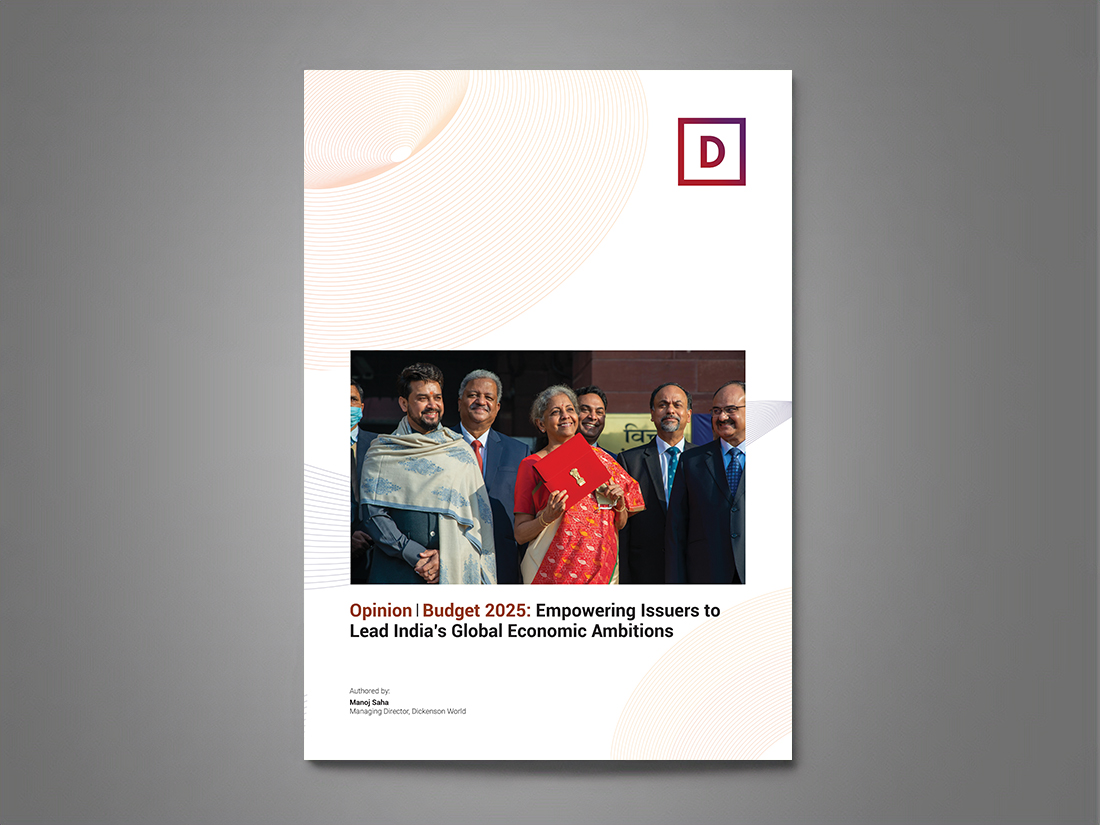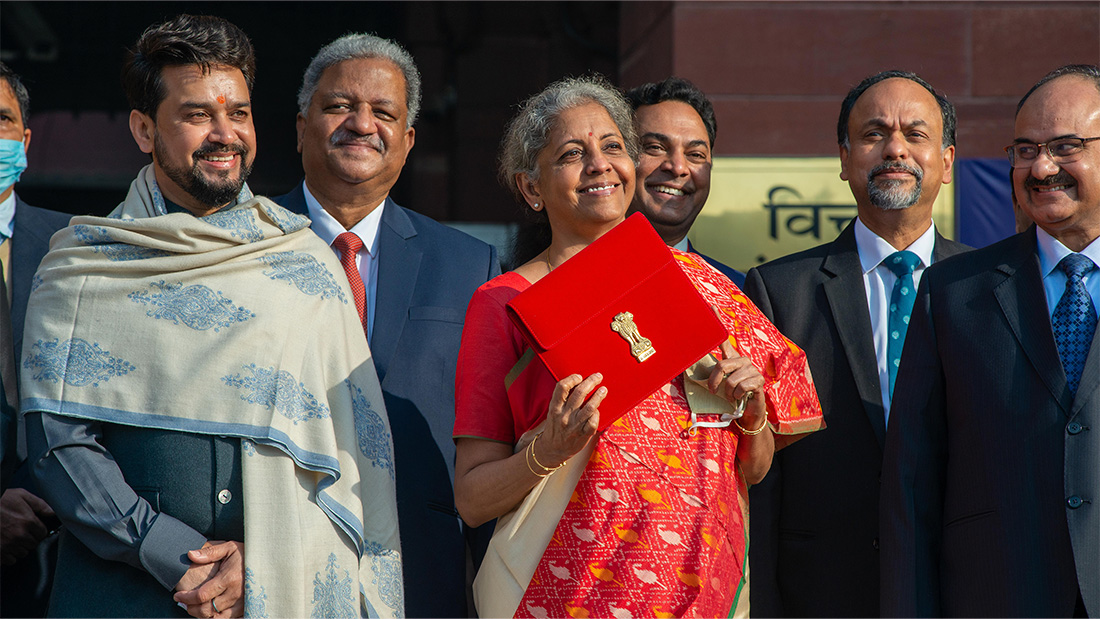Opinion | Budget 2025:
Empowering Issuers to Lead India’s Global Economic Ambitions
India is at a pivotal crossroads, with an opportunity to cement its position as a global economic powerhouse. The country’s resilience is evident: GDP growth for the October-December quarter is projected at a robust 6.2%, and the IPO pipeline is brimming with over ₹1 trillion in potential offerings. Yet, this optimism belies a critical truth—India’s economic ascent is not without hurdles. Exchange rate volatility, inflationary pressures, capital outflows, and limited access to affordable credit are macroeconomic challenges that threaten to derail this progress.
For issuers, these are not abstract policy issues; they are immediate and daily challenges that shape financial decisions, investment opportunities, and long-term growth trajectories. Whether it is IT exporters managing forex risks, MSMEs struggling with high input costs, or corporates facing investor scepticism, each player is navigating a storm of uncertainties. The upcoming Union Budget 2024-25, led by Hon’ble Finance Minister Smt. Nirmala Sitharaman, provides a crucial opportunity to tackle these systemic obstacles head-on and lay the foundation for an issuer-friendly ecosystem. If India gets this right, it can empower issuers not just to overcome challenges but to position themselves as the driving force of India’s global economic ambitions.
Tackling Exchange Rate Volatility: Building Stability, Strength, and Trust
The persistent depreciation of the rupee against the U.S. dollar has become a formidable challenge for Indian issuers. Between January and September 2023, the rupee fell by over 7% against the dollar, making it one of Asia’s worst-performing currencies in the year. For companies with significant foreign currency exposures—such as IT exporters, pharmaceutical giants, and capital-intensive industries reliant on imported raw materials—this volatility has eroded margins and disrupted financial planning.
Larger companies like Infosys and TCS have consistently used hedging strategies such as forward contracts and options to safeguard their foreign earnings. This has shielded them from severe market swings, but smaller issuers and MSMEs often lack the resources or expertise to deploy such measures effectively. The budget must address this disparity by introducing subsidized hedging tools specifically tailored for MSMEs, making currency risk management affordable and accessible.
Moreover, the government could partner with banks and financial institutions to provide advisory services and training programs on forex risk management. This would help smaller issuers understand and adopt these tools. At the macro level, strengthening foreign exchange reserves and implementing targeted interventions in forex markets—similar to Japan’s yen stabilization measures—can provide much-needed stability. A strong and predictable rupee instils confidence in foreign investors while reducing financial uncertainty for domestic issuers.
Enhancing Capital Access: Aligning Policies with Global Standards
India’s IPO market has been vibrant in recent years, but foreign investor sentiment remains cautious. In 2023, net outflows from India’s bond markets reached nearly $3 billion, largely driven by rising U.S. interest rates and global uncertainty. This has led to higher borrowing costs for Indian issuers and weakened their access to affordable capital.
The government must use the budget to implement bold, investor-friendly reforms. First, rationalizing capital gains tax and reducing or eliminating the dividend distribution tax (DDT) would make India’s tax regime globally competitive and attractive to foreign portfolio investors. Singapore, for instance, has thrived as an investment hub by maintaining a zero capital gains tax, while the UAE attracts global funds with low tax rates and clear regulatory frameworks. India must position itself as equally attractive, particularly for long-term equity investors.
Second, issuers should be incentivized to adopt integrated reporting frameworks, which link financial disclosures with environmental, social, and governance (ESG) metrics. Global institutional investors are increasingly prioritizing sustainability, and issuers who embrace this trend will stand out. Companies like Wipro, which has committed to carbon neutrality, and Tata Steel, which has earned recognition for sustainable steel production, have successfully leveraged ESG-driven transparency to attract foreign capital. The government could allocate funds to subsidize ESG training for smaller issuers and MSMEs, enabling them to meet global sustainability standards.
Lastly, the government must fast-track initiatives like GIFT City, India’s ambitious attempt to build a global financial hub. Despite its potential, GIFT City has seen slow progress in attracting major international players. The budget should allocate resources to accelerate infrastructure development and provide enhanced tax incentives for companies that operate within the GIFT City framework. A single-window clearance system for foreign investments could further reduce red tape and enhance India’s attractiveness to global investors.
Empowering MSMEs: The Backbone of India’s Economy
MSMEs account for nearly 30% of India’s GDP and employ over 110 million people, yet they remain the most vulnerable segment of the economy. Persistent issues such as limited access to credit, high input costs, and fragmented supply chains hinder their growth and global competitiveness. The upcoming budget must prioritize the empowerment of MSMEs to ensure inclusive and sustainable economic growth.
Expanding the Credit Guarantee Fund Trust for Micro and Small Enterprises (CGTMSE) is a critical step. By increasing its corpus and expanding its coverage, banks can be encouraged to lend to MSMEs without requiring collateral, addressing the sector’s liquidity crunch. Additionally, subsidized credit schemes tailored to MSME needs could provide affordable financing options for small enterprises. However, credit solutions alone are insufficient.
The government should also focus on modernizing MSME operations by incentivizing the adoption of digital tools, automation, and AI-driven supply chain solutions. Tax rebates or subsidies for technology adoption could drive productivity gains and reduce operational inefficiencies. Germany’s Mittelstand model, where small and medium enterprises thrive through a combination of technological prowess and export support, offers valuable lessons. India must adopt a similar model, providing MSMEs with the tools and incentives to integrate into global value chains.
Export-oriented MSMEs, in particular, require tailored support. Expanding export promotion schemes and introducing affordable hedging tools would protect smaller exporters from rupee volatility and geopolitical uncertainties. Investments in industrial infrastructure within MSME clusters would also stabilize input costs, improve margins, and enable long-term growth.
A Bold Vision for India’s Future
The upcoming budget is more than a fiscal exercise; it is a chance to reset the narrative of India’s economic future. Hon’ble Finance Minister Smt. Nirmala Sitharaman must seize this moment to empower issuers and ensure their role in driving India’s global economic ambitions.
By stabilizing the rupee, enhancing capital access, and strengthening MSMEs, the government can create an ecosystem where issuers flourish, investors trust, and India thrives as a global economic leader. Every reform, every policy, and every investment must be aligned with this vision. The choices made in this budget will determine whether India capitalizes on its potential or allows structural challenges to hold it back.
The world is watching. It is time for India to lead.
Contact Us: To learn more or schedule a consultation, please reach out to us at www.dickensonworld.com
Email:enquiry@dickensonworld.com.
About the Author
With over 25 years of experience in corporate finance and a deep-rooted understanding of ESG imperatives, Manoj Saha brings a wealth of knowledge to the discourse on corporate governance. Educated in the UK in Accountancy & Finance, he has dedicated his career to guiding organizations through the intricacies of financial management and stakeholder engagement across global markets, including India, the USA, the UK, and the Middle East and North Africa (MENA) region.

Opinion | Budget 2025
To download and save this article.
Authored by:
Manoj Saha
Managing Director, Dickenson World
Visit www.dickensonworld.com to learn more about our services and how we can help streamline your corporate reporting process.


Leave A Comment